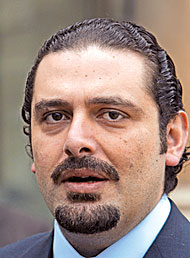 Anti Syrian MP Antoine Ghanem was murdered on Wednesday, just days away from the parliamentary elections to appoint Lebanon's next president. 5 others were killed, and over 50 wounded. A powerful blast that ripped through Ghanem's car in the east Beirut Sin el-Fil suburb, in what appears to be a bloody scheme to strip the Anti Syrian March 14 coalition of its parliamentary majority just six days before a scheduled session to elect a new president.
Anti Syrian MP Antoine Ghanem was murdered on Wednesday, just days away from the parliamentary elections to appoint Lebanon's next president. 5 others were killed, and over 50 wounded. A powerful blast that ripped through Ghanem's car in the east Beirut Sin el-Fil suburb, in what appears to be a bloody scheme to strip the Anti Syrian March 14 coalition of its parliamentary majority just six days before a scheduled session to elect a new president.Antoine Ghanem was the eighth member of the anti-Syrian majority to be assassinated since the 2005 murder of former billionaire premier Rafiq Hariri. World powers condemned the attack as a blatant bid to destabilize Lebanon ahead of Tuesday's parliamentary session to choose a successor to pro-Syrian President Emile Lahoud, saying it exacerbated a months-long political crisis.
A 40-kilogram strong car bomb explosion shattered Ghanem's black Chevrolet Sedan as it drove in the plush suburb, killing him and eight other people, including his driver and an unidentified person who was sitting next to the slain MP on the back seat of the vehicle. Two of the deputy's bodyguards were among the dead, according to Ghanem's daughter, Mounia.
Tongues of flame shot up from the wreckage of Ghanem's car and at least eight other vehicles as fire fighters combated the blaze and ambulances evacuated at least 47 wounded people to nearby hospitals. The powerful explosion, which echoed across the Lebanese capital, shattered glass windows in Sin el-Fil and the plush suburb of Horsh Tabet.
People wailed and screamed at hospitals where some of the injured were transported and pleaded with staff for information about the fate of loved ones. "Tony is gone, Tony is gone. My tall blond son is gone," wailed a woman, as she pulled her hair and raised her hands to the sky outside the Lebanese Canadian Hospital. She said her son, Tony Daou, 23, was a bodyguard of Ghanem.
| The crime was committed three months after a similar car bomb explosion on June 14 which claimed the life of MP Walid Eido. Ghanem, 64, returned to Beirut from safe haven in Abu Dhabi two days ago. |
"He felt threatened, just like all the other members of the majority are threatened by the regime of (Syrian President) Bashar al-Assad," he said in tears.
MP Saad Hariri blamed the assassination on the "cowardly regime" of Syrian President Bashar Assad. Druze leader Walid Jublatt also said Assad's regime is behind Ghanem's assassination, pledging that "we will not succumb to Bashar Assad's threat." A Friend of the victim, speaking on condition of anonymity, quoted Ghanem as telling him Tuesday evening: "I face the threat of assassination. They want to kill me to open the door for by-elections to choose a new MP from (Michel Aoun's) Free Patriotic Movement."
Ghanem had represented the Baabda-Aley constituency in parliament since the year 2000. Ghanem's constituency houses Hizbullah's stronghold in the southern suburbs of Beirut, where the party that is opposed to the March 14 alliance carries a sizeable influence. Hizbullah, also backed by Iran, is allied with Aoun's FPM in the attempt to topple Prime Minister Fouad Saniora's government and prevent the election of a new president who is not controlled by the Damascus regime of President Bashar Assad.
In addition to Ghanem and Eido, MP and Industry Minister Pierre Gemayel, a prominent member of the Phalange Party and the March 14 alliance, was gunned down by unidentified assailants on Nov. 21. By-elections held on Aug. 5 in Gemayel's Metn constituency were won by FPM candidate Camille Khoury, thus stripping the March 14 alliance of a vote in the presidential elections to choose a successor to Syrian-Backed President Emile Lahoud.
Pro Syrian Parliament Speaker Nabih Berri had summoned Parliament to elect a head of state on Sept. 25. Lahoud's extended term expires on Nov. 24.

 "I have never seen a more cowardly regime than that of Bashar Assad's," said lawmaker Saad Hariri, blaming the Syrian president for Ghanem's death. Hariri heads the anti-Syrian majority in Parliament, a role he stepped into after his father, former Prime Minister Rafik Hariri, was killed by car bomb in 2005.
"I have never seen a more cowardly regime than that of Bashar Assad's," said lawmaker Saad Hariri, blaming the Syrian president for Ghanem's death. Hariri heads the anti-Syrian majority in Parliament, a role he stepped into after his father, former Prime Minister Rafik Hariri, was killed by car bomb in 2005.  Pro-Syrian President Emile Lahoud also implied Ghanem's death was meant to undermine the upcoming elections, saying "it is no coincidence that whenever there are positive signs" that someone is killed.
Pro-Syrian President Emile Lahoud also implied Ghanem's death was meant to undermine the upcoming elections, saying "it is no coincidence that whenever there are positive signs" that someone is killed.